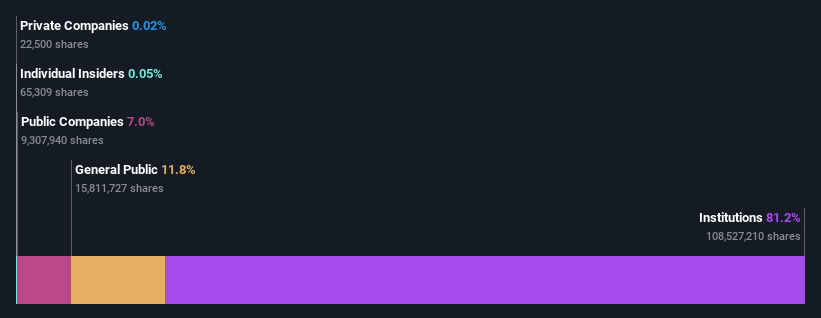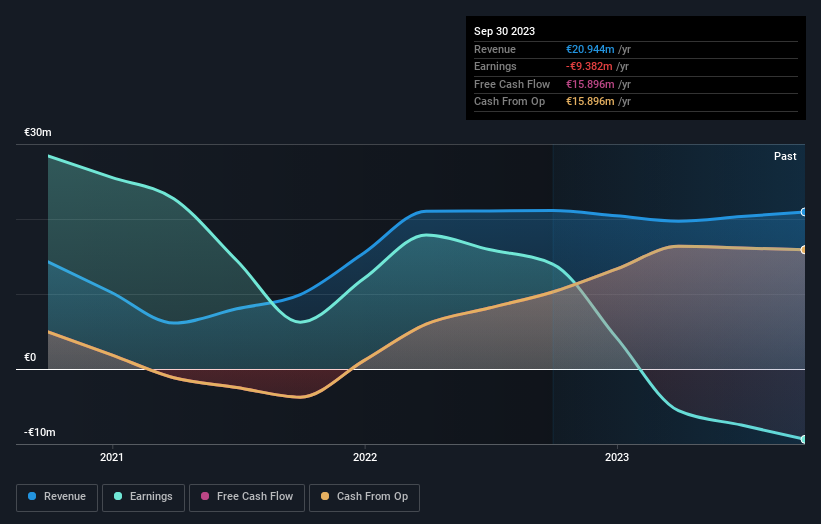Schroder European Real Estate Investment Trust Plc (LON:SERE) is favoured by institutional owners who hold 81% of the company
Key Insights
Given the large stake in the stock by institutions, Schroder European Real Estate Investment Trust's stock price might be vulnerable to their trading decisions
The top 7 shareholders own 53% of the company
Ownership research, combined with past performance data can help provide a good understanding of opportunities in a stock
To get a sense of who is truly in control of Schroder European Real Estate Investment Trust Plc (LON:SERE), it is important to understand the ownership structure of the business. With 81% stake, institutions possess the maximum shares in the company. That is, the group stands to benefit the most if the stock rises (or lose the most if there is a downturn).
Given the vast amount of money and research capacities at their disposal, institutional ownership tends to carry a lot of weight, especially with individual investors. As a result, a sizeable amount of institutional money invested in a firm is generally viewed as a positive attribute.
In the chart below, we zoom in on the different ownership groups of Schroder European Real Estate Investment Trust.
Check out our latest analysis for Schroder European Real Estate Investment Trust
What Does The Institutional Ownership Tell Us About Schroder European Real Estate Investment Trust?
Institutional investors commonly compare their own returns to the returns of a commonly followed index. So they generally do consider buying larger companies that are included in the relevant benchmark index.
Schroder European Real Estate Investment Trust already has institutions on the share registry. Indeed, they own a respectable stake in the company. This implies the analysts working for those institutions have looked at the stock and they like it. But just like anyone else, they could be wrong. It is not uncommon to see a big share price drop if two large institutional investors try to sell out of a stock at the same time. So it is worth checking the past earnings trajectory of Schroder European Real Estate Investment Trust, (below). Of course, keep in mind that there are other factors to consider, too.
Since institutional investors own more than half the issued stock, the board will likely have to pay attention to their preferences. We note that hedge funds don't have a meaningful investment in Schroder European Real Estate Investment Trust. Our data shows that Brewin Dolphin Wealth Management Limited is the largest shareholder with 16% of shares outstanding. Schroder Investment Management Limited is the second largest shareholder owning 8.4% of common stock, and Lloyds Banking Group plc holds about 7.0% of the company stock.
We also observed that the top 7 shareholders account for more than half of the share register, with a few smaller shareholders to balance the interests of the larger ones to a certain extent.
Researching institutional ownership is a good way to gauge and filter a stock's expected performance. The same can be achieved by studying analyst sentiments. As far as we can tell there isn't analyst coverage of the company, so it is probably flying under the radar.
Insider Ownership Of Schroder European Real Estate Investment Trust
While the precise definition of an insider can be subjective, almost everyone considers board members to be insiders. Management ultimately answers to the board. However, it is not uncommon for managers to be executive board members, especially if they are a founder or the CEO.
I generally consider insider ownership to be a good thing. However, on some occasions it makes it more difficult for other shareholders to hold the board accountable for decisions.
Our most recent data indicates that insiders own less than 1% of Schroder European Real Estate Investment Trust Plc. It has a market capitalization of just UK£82m, and the board has only UK£40k worth of shares in their own names. Many investors in smaller companies prefer to see the board more heavily invested. You can click here to see if those insiders have been buying or selling.
General Public Ownership
The general public, who are usually individual investors, hold a 12% stake in Schroder European Real Estate Investment Trust. While this group can't necessarily call the shots, it can certainly have a real influence on how the company is run.
Public Company Ownership
We can see that public companies hold 7.0% of the Schroder European Real Estate Investment Trust shares on issue. This may be a strategic interest and the two companies may have related business interests. It could be that they have de-merged. This holding is probably worth investigating further.
Next Steps:
It's always worth thinking about the different groups who own shares in a company. But to understand Schroder European Real Estate Investment Trust better, we need to consider many other factors. For example, we've discovered 2 warning signs for Schroder European Real Estate Investment Trust (1 is concerning!) that you should be aware of before investing here.
Of course this may not be the best stock to buy. Therefore, you may wish to see our free collection of interesting prospects boasting favorable financials.
NB: Figures in this article are calculated using data from the last twelve months, which refer to the 12-month period ending on the last date of the month the financial statement is dated. This may not be consistent with full year annual report figures.
Have feedback on this article? Concerned about the content? Get in touch with us directly. Alternatively, email editorial-team (at) simplywallst.com.
This article by Simply Wall St is general in nature. We provide commentary based on historical data and analyst forecasts only using an unbiased methodology and our articles are not intended to be financial advice. It does not constitute a recommendation to buy or sell any stock, and does not take account of your objectives, or your financial situation. We aim to bring you long-term focused analysis driven by fundamental data. Note that our analysis may not factor in the latest price-sensitive company announcements or qualitative material. Simply Wall St has no position in any stocks mentioned.

 Yahoo Finance
Yahoo Finance 

